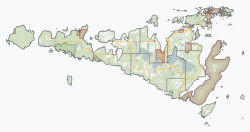Billings is a township in the Canadian province of Ontario, as well as the name of a community within that township.
Billings | |
|---|---|
| Township of Billings | |
 | |
| Coordinates: 45°54′N 82°15′W / 45.900°N 82.250°W | |
| Country | Canada |
| Province | Ontario |
| District | Manitoulin |
| Incorporated | 1884 |
| Government | |
| • Type | Township |
| • Mayor | Bryan William Barker |
| • MP | Carol Hughes (NDP) |
| • MPP | Michael Mantha (NDP) |
| Area | |
| • Land | 209.64 km2 (80.94 sq mi) |
| Population (2016)[1] | |
• Total | 603 |
| • Density | 2.9/km2 (8/sq mi) |
| Time zone | UTC-5 (EST) |
| • Summer (DST) | UTC-4 (EDT) |
| Postal code | P0P 1J0 |
| Area codes | 705, 249 |
| Website | www |
Located in the Manitoulin District, the township had a population of 603 in the Canada 2016 Census.
Communities
editThe primary community in the township is Kagawong. There are three smaller communities: Billings, Bowser's Corner, and Pleasant Valley.
Kagawong
editKagawong's harbour is located on Mudge Bay and is home to the Kagawong Lighthouse, which has been in continuous service since 1888. The name Kagawong means "where mists rise from falling waters" in the Ojibwe language, a reference to the nearby Bridal Veil Falls on the Kagawong River.
Kagawong is home to numerous tourist attractions. The most popular being the famed Bridal Veil Falls. The legend is that those who swim under the falls are rewarded with good luck. The falls begin at the end of the upper Kagawong river, and flow past a series of small, cascading waterfalls down a winding trail towards Mudge Bay. The trails are spotted with art pieces, benches and picnic tables. In addition to the falls, Kagawong is also home to a Transportation and Communication Museum, Art Gallery, Anglican Church, several sandy beaches, and many camping and cottage rental opportunities.
Kagawong is the nearest port of call to the islands of the North Channel, being directly south of Clapperton Island and the Benjamin Islands.
Demographics
edit| Year | Pop. | ±% |
|---|---|---|
| 2001 | 551 | — |
| 2006 | 539 | −2.2% |
| 2011 | 506 | −6.1% |
| 2016 | 603 | +19.2% |
| [2][3][1] | ||
In the 2021 Census of Population conducted by Statistics Canada, Billings had a population of 753 living in 343 of its 675 total private dwellings, a change of 24.9% from its 2016 population of 603. With a land area of 208.81 km2 (80.62 sq mi), it had a population density of 3.6/km2 (9.3/sq mi) in 2021.[4]
| 2021 | 2016 | 2011 | |
|---|---|---|---|
| Population | 753 (+24.9% from 2016) | 603 (+19.2% from 2011) | 506 (-6.1% from 2006) |
| Land area | 208.81 km2 (80.62 sq mi) | 209.64 km2 (80.94 sq mi) | 209.30 km2 (80.81 sq mi) |
| Population density | 3.6/km2 (9.3/sq mi) | 2.9/km2 (7.5/sq mi) | 2.4/km2 (6.2/sq mi) |
| Median age | 56.8 (M: 57.2, F: 56.8) | 51.4 (M: 50.9, F: 51.9) | |
| Private dwellings | 675 (total) 343 (occupied) | 731 (total) | 704 (total) |
| Median household income | $81,000 | $68,779 |
Transportation
editHighway 540 is the main road in the township and provides connections to Gore Bay and Mindemoya.
See also
editReferences
edit- ^ a b c "Census Profile, 2016 Census: Billings, Township". Statistics Canada. 8 February 2017. Retrieved June 20, 2019.
- ^ Statistics Canada: 2001, 2006 census
- ^ "Billings census profile". 2011 Census of Population. Statistics Canada. Retrieved 2012-02-24.
- ^ "Population and dwelling counts: Canada, provinces and territories, census divisions and census subdivisions (municipalities), Ontario". Statistics Canada. February 9, 2022. Retrieved April 2, 2022.
- ^ "2021 Community Profiles". 2021 Canadian census. Statistics Canada. February 4, 2022. Retrieved 2023-10-19.
- ^ "2016 Community Profiles". 2016 Canadian census. Statistics Canada. August 12, 2021. Retrieved 2019-06-20.
- ^ "2011 Community Profiles". 2011 Canadian census. Statistics Canada. March 21, 2019. Retrieved 2012-02-24.
- ^ "2006 Community Profiles". 2006 Canadian census. Statistics Canada. August 20, 2019.
- ^ "2001 Community Profiles". 2001 Canadian census. Statistics Canada. July 18, 2021.

